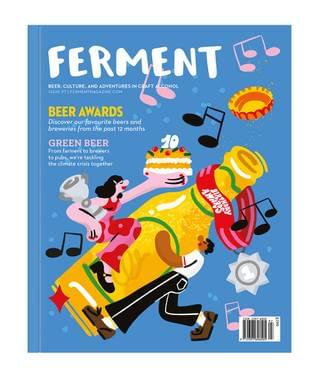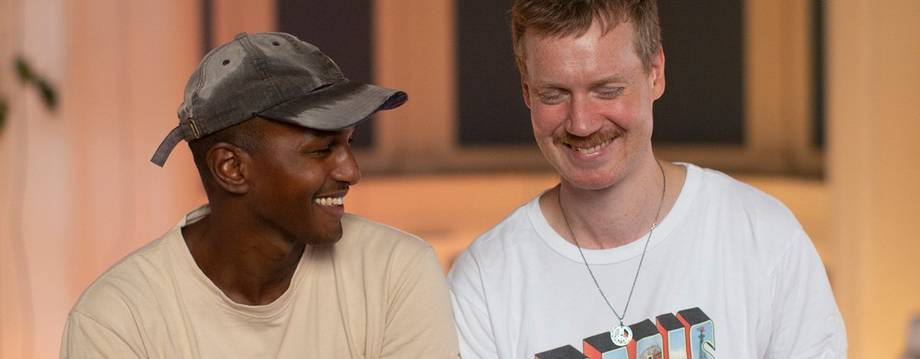Omnipollo
• • • Worldwide Legends • • •
Robyn Gilmour
Saturday 21 October 2023

This article is from
10th Birthday Awards
issue 97
Share this article
There have been no boundaries to the endeavour undertaken by Omnipollo; that is to say, they have created, collaborated, and contracted in all corners of the world, to make beer that’s local, globally. “We're in constant transition,” says co-founder Karl Grandin, “but I think when we started out in 2010, we were most enticed by the knowledge that there were pockets of like-minded people around the globe. Our first motivation was to connect with, and serve those people, and so for us to be in 50 countries at once, right from the outset, our vehicle to getting there had to be contract brewing. Not only would working this way get us closest to the end consumer, but we could scale up, scale down, and take risks in a way that was totally free.”
Omnipollo has changed our industry single-handedly, though Karl and co-founder Henok Fentie would no doubt argue that it took many hands to build a brand that transcends nationality, and erases the border between beer and graphic design. Though I had a vague sense of it before speaking with Karl and Henok, I leave our conversation with the powerful impression that Omnipollo is a shimmering, amorphous entity that, above all else, champions the playfulness, creativity, and complexity that’s common to all people.
Bizarrely, Henok came to craft beer by accident, when he was hired by a brewpub chain in Sweden straight out of university. He’d studied in the UK, and so while he’d enjoyed traditional ales there, his perception of beer expanded once he was surrounded by styles from the UK, US, Belgium, Germany, the Czech Republic, and beyond. “That was when I realised the challenge for brewers everywhere is the same,” says Henok, “and that’s how to get people to appreciate better beer.”
He started homebrewing, then later progressed to work at a brewery in Belgium, all the while wondering “what if we released something into the world that changed how people think about beer? It would have to be more than good beer, there was already good beer out there. To make beer that did things differently, there would need to be an element of storytelling involved, and for packaging to be more approachable. At the beginning, I wasn’t thinking about the physical package, or the artwork – we hadn’t figured that out yet – I was more like, ‘Okay, how do we move this craft beer phenomenon from specialised beer bars into other areas of nightlife, like nightclubs, and bars and restaurants where a quality experience is important, but craft beer doesn’t feature?’”

PHOTO: Henok and Karl
This was Henok’s project while living and brewing in Belgium. He was developing the recipe for what would become Omnipollo’s first ever beer when a mutual friend, an art curator, introduced Henok to Karl. “Ten minutes after I’d told her about this project, she called Karl and set up a sort of blind date for us,” says Henok. Both co-founders reminisce on this moment fondly. The call that reached Karl found him, not so much at a crossroads in his career, but in a moment of flux.
As an illustrator and graphic designer by training, and an artist by practice, Karl had just transitioned away from the world of commercial art, and had begun to freelance on work that was more dynamic, included more people, and featured more people’s expertise. “I wanted to work with people who knew things I didn’t know, and to be a part of a bigger machine while also being able to express who I am,” says Karl.
“Stolkholm isn’t a small city, but it also isn’t a big city, so I’d heard of Henok and his previous projects before I met him, but when I did, I didn’t doubt him at all. He was just super passionate, and had this amazing knowledge of beer, but the thing that was most attractive to me was that he wasn’t trying to brew a Swedish version of this style, or a Belgian version of that beer, he didn’t want to start a cover band, he wanted to make music that no one had ever heard before.”
With Karl and Henok connected, the nomic, amorphous, transcendent project that was and is Omnipollo, was underway. There is just one final important part of the puzzle to mention here, and that was the contribution of ex-head brewer, Carlos de la Barra, who I have been fortunate enough to call my colleague over the last year. That Omnipollo would eventually establish a brewery of its own in Stockholm was never a given, there was a time when it looked like the brand’s model would be to contract brew indefinitely.
The longevity of this project depended entirely on the experience and rigour of a brewer like Carlos, who travelled the world on Omnipollo’s behalf, overseeing the production of its beer at hosting breweries, and ultimately adding credibility to a brand now renowned for its quality. “When Carlos got in touch to ask if we wanted in on this project together, we thought ‘there’s no better person to brew Omnipollo beer than Carlos’” says Henok. “Except this time we’re getting paid for it, not him”, Karl concludes with a smile.
Share this article

